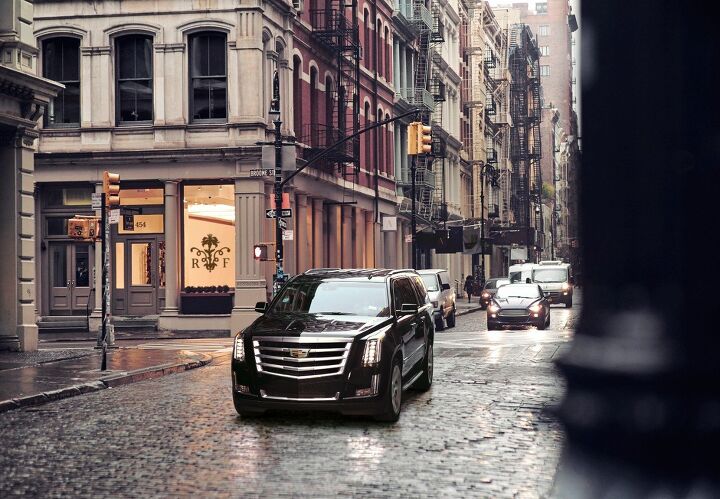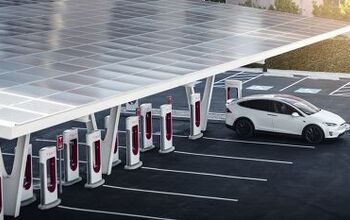Premium SUV Market Share Grows as Transaction Prices Head South

With consumers crawling all over crossovers and SUVs, you’d think that automakers would be eager to make some extra cash by generously hiking transaction prices.
Well, automakers might want it, but they certainly aren’t foolish enough to do it. Not in this stagnating marketplace, and not with the importance heaped on that wildly competitive segment. According to Kelley Blue Book, the average transaction price growth in all SUV and crossover segments remains at or below inflation.
However, when it compared transaction prices — minus incentives — in January of this year compared to the same month last year, the research company found that a certain hot-selling segment saw a consistent drop in window sticker value.
The industry as a whole saw transaction prices rise, on average, 3.3 percent year-over-year. Minivan prices, energized by the mid-year introduction of the Chrysler Pacifica, rose 4 percent. Entry-level luxury cars rose 4.8 percent. The rest? Not much to talk about.
Utility vehicles, on the other hand, didn’t come close to the average. Compact utilities saw transaction prices rise a modest 1.5 percent, which midsize models rose by 1.6 percent. Full-size utilities were subject to the largest price increase, though that figure was only 2 percent. On the bottom rung, subcompact crossovers and SUVs actually saw a price decrease compared to last January, dropping 0.6 percent.
On the luxury side, all segments dropped in average price. Compact luxury utility vehicles dropped an imperceptible 0.1 percent, while midsize models fell 0.9 percent. It’s at the top of the range where the difference was greatest — full-size luxury utilities saw average transaction prices that were 2.2 percent lower last month than in January 2016.
The pricing trend seems to jibe with the segment’s popularity.
According to TTAC sales guru Tim Cain, premium auto brand SUV and crossover sales jumped 13 percent to 1.1 million units in the U.S. in 2016. Contrast that with utility offerings from mainstream brands, which grew 7 percent last year. Premium brands – boosted by the introduction of Jaguar, Maserati, Bentley – own 16 percent of the U.S. utility vehicle market.
Automakers rake in big profits from luxury vehicles, especially those capable of hauling generous amounts of cargo. That leaves a cushion to beat off rivals with competitive pricing.
[Image: General Motors]

More by Steph Willems
Latest Car Reviews
Read moreLatest Product Reviews
Read moreRecent Comments
- Jor65756038 As owner of an Opel Ampera/Chevrolet Volt and a 1979 Chevy Malibu, I will certainly not buy trash like the Bolt or any SUV or crossover. If GM doesn´t offer a sedan, then I will buy german, sweedish, italian, asian, Tesla or whoever offers me a sedan. Not everybody like SUV´s or crossovers or is willing to buy one no matter what.
- Bd2 While Hyundai has enough models that offer a hybrid variant, problem has been inadequate supply, so this should help address that.In particular, US production of PHEVs will make them eligible for the tax credit.
- Zipper69 "At least Lincoln finally learned to do a better job of not appearing to have raided the Ford parts bin"But they differentiate by being bland and unadventurous and lacking a clear brand image.
- Zipper69 "The worry is that vehicles could collect and share Americans' data with the Chinese government"Presumably, via your cellphone connection? Does the average Joe in the gig economy really have "data" that will change the balance of power?
- Zipper69 Honda seem to have a comprehensive range of sedans that sell well.


































Comments
Join the conversation
I think competition is keeping a cap pricing. A larger selection of SUVs to choose from is great.
I have to think at some point this is a matter of hitting a price ceiling on what even well-heeled consumers are willing to pay for full size SUVs. They gone far past the rate of inflation, the average Escalade for example probably leaves the dealership at $90k. You;re talking a VERY small amount of people that can afford that type of car. A Tahoe or Suburban is like $70k-$80k plus these days. These used to be upper-middle class vehicles, not something that was associated with being very wealthy.